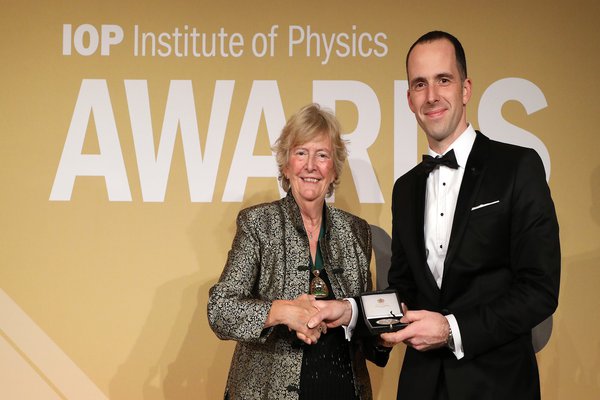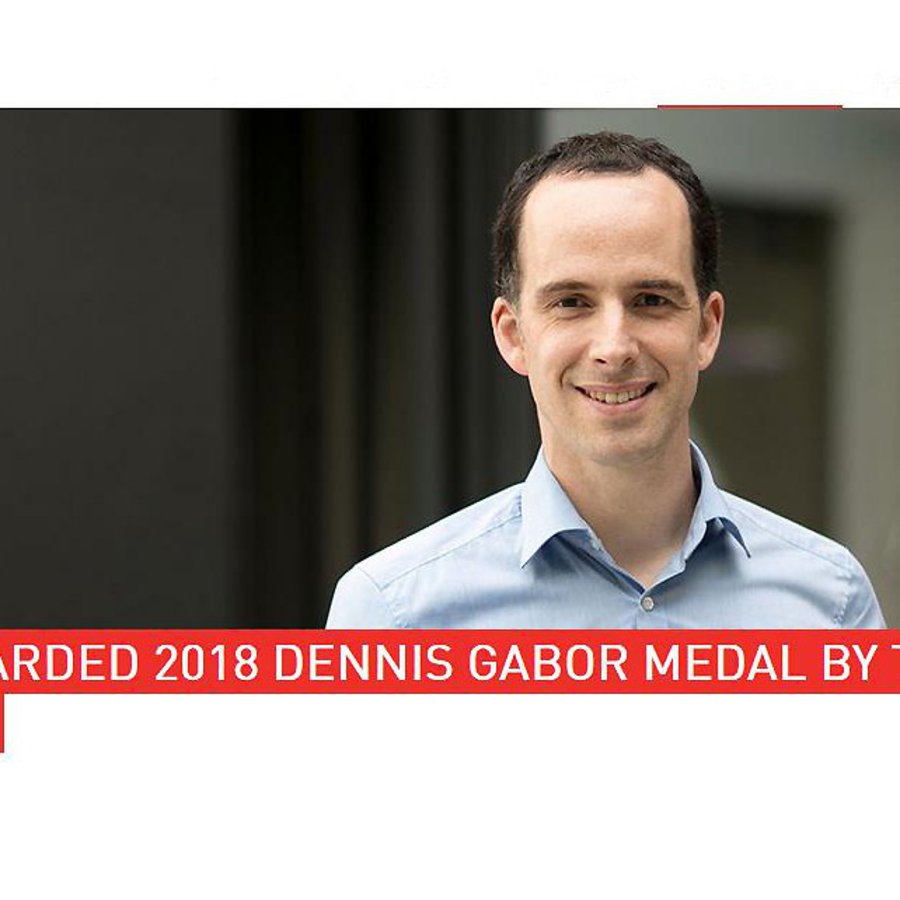
Nach seinem Abschluss an der FH Kiel 2006 ging er nach Großbritannien, blieb dort und machte Karriere. Am Dienstagabend wurde Dr. Nils Hempler (38) die Dennis Gabor Medal verliehen. Susanne Meise aus der viel.-Redaktion hat den heute in Glasgow lebenden Hamburger dazu befragt.
Dr. Hempler, you have been awarded the Dennis Gabor Medal from the Institute of Physics for your contribution to physics in an industrial context. Can you tell us what specific innovations the prize was awarded for?
I was awarded the Dennis Gabor Medal for several reasons. I established M Squared Innovation, contributed to the UK’s national quantum technology programme, helped to commercialise airy-beam light-sheet imaging systems and developed novel chemical sensing modalities.
I set up the innovation division of M Squared back in 2012. Since then, I have overseen the growth of the business, which now employs 35 high-level science graduates who focus predominantly on open innovation. The innovation division has been instrumental in the fast growth of the M Squared business as a whole; securing around £43 million worth of investment for the development of novel technologies.
The UK launched the National Quantum Technologies Programme in 2014 to develop advanced sensors, clocks and computers with unprecedented levels of performance. M Squared has been involved right from the start by supplying lasers to support researchers in the field, as well as developing novel quantum systems through its Innovation division. I have championed the development of new devices that rely on quantum effects, such as quantum entanglement and superposition, to create a quantum gravimeter and quantum accelerometer. Our skills and expertise in this area have helped to position M Squared at the heart of the emerging UK quantum supply chain.
In the area of light-sheet microscopy, I was involved in taking a new approach to biomedical imaging from the University of St. Andrews and translated it into a new division of M Squared. The technology named 'airy-beam light sheet microscopy' offers large-volume, high throughput imaging capabilities for research in neuroscience, oncology and regenerative medicine.
Finally, the award also recognised my involvement in developing new chemical sensing modalities for the remote detection of threats as well as novel Raman spectrometers to prevent counterfeiting in the distilled spirits industry.
What does it mean to you to receive this prize?
I have worked incredibly hard over the years to make significant progress, so receiving this prize is an absolute honour, and I feel humbled to be recognised by an organisation as distinguished as the Institute of Physics. I am also reminded that my achievements would not have been possible alone, it has taken a large team of talented and passionate scientist and engineers to make the extent of this work possible.
How did you end up working for M Squared?
My interest in lasers began during the ‘Lasertechnik’ lectures given by Professor Sowada during my time at university. I became mesmerised by the theory of lasers. For my internship in the 8th semester, Professor Sowada suggested I might want to expand my horizons and work in the field abroad. I took the advice and worked at Coherent in Scotland for nine months to gain practical experience in laser development. Once I'd finished my undergrad at FH Kiel in 2006, I returned to Scotland to work on my PhD in laser physics at the Institute of Photonics at the University of Strathclyde which I completed in 2010. Once I started to look at my career prospects, I became aware of M Squared's growing reputation for designing and engineering advanced laser systems. The company was only four years old at this point, and the idea of joining a small but ambitious company was immensely exciting. I started as a laser engineer at M Squared, and in hindsight, this was a pivotal point in my career.
Anything from your time at the Fachhochschule Kiel that helped you during your work?
A plethora of things from my time at the Fachhochschule Kiel have been beneficial. I think many benefits came from the interdisciplinary nature of the Mechatronik course. Mechanical and electrical engineering, optical systems, and software are topics I discuss daily. It's this expansive knowledge that allows me to lead technical teams. More importantly, however, the multifaceted nature of the mechatronic course taught me how to acquire new knowledge quickly. In my position, as Head of Innovation, this is critical for example I need to be competent in quantum technologies in one meeting and biomedical imaging in the next.
How are the work conditions between Germany and the UK different and how does this affect the possibilities to innovate in the UK vs Germany?
I have worked in the UK throughout my entire professional career, so it is difficult for me to compare the two countries based on any first-hand experience. Germany has a well-established and desirable ‘Mittelstand’ where it is recognised that a strong base of SMEs forms a solid foundation for a resilient economy. The 2008 financial crisis struck the UK quite hard, so one might say the UK needs to continue to strengthen their own ‘Mittelstand’. The UK government is hugely supportive, and it is investing heavily into industrial R&D. This support has undoubtedly helped companies like M Squared and its innovation division achieve high-growth.
Have you ever thought about returning to Germany?
I have indeed thought of returning to Germany, but never more than during my first few years in the UK. Over time, however, I started to build relationships with professors, fellow students, and latterly colleagues and professionals who have all supported me on my journey. These relationships worked to tie me to the place that has become more and more familiar. I guess, over the years, I have grown country-agnostic, so it doesn't matter where I live, I still have my heritage, and I also have my family, friends and colleagues. In the UK I have had many opportunities to achieve great things, and I believe that no matter where I live, I will maintain a 'science is global' approach to my work. It's not so important to think about where one is based; it is, however, vital to think about what one chooses to do.
What advice would you give to students that are studying mechatronics now?
I did not start my life feeling driven, not until I found something that completely fascinated me. At that point, I had a Eureka moment, and that passion also awoke the desire and drive to push myself harder than ever before. My advice is, take the time to find out what you truly love doing and do it.


